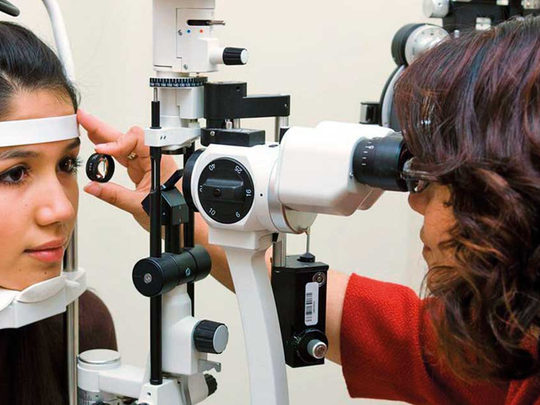
Dubai: Diabetics must never underestimate the risk of losing their eyesight due to the grievous nature of the disease, warn UAE-based eye doctors.
In an ongoing public mission to protect the eye health of diabetics, ophthalmologists are reminding those with the disease that regular eye examinations are a must.
Dr Madhav Rao |
The threat of losing one’s vision looms large in the UAE, given that 750,000 residents are medically confirmed of being diabetic and 300,000 others remain undiagnosed.
“All diabetics are at a risk of developing eye problems, whether they are controlling the disease or not,” said Dr Madhav Rao, Consultant Ophthalmologist and Vitreo-Retinal Surgeon at Burjeel Hospital, Abu Dhabi.
“This is because high blood sugar and pressure levels can weaken blood vessels, and consequently cause leaking and damage to the retina, known as diabetic retinopathy.”
Eye problems normally take a few years to develop in diabetics. By attending regular screenings, detecting any eye problem at an early stage can help prevent the development of a more aggressive form of the disease, which could lead to blindness if not treated early enough, he explained.
“While diabetics cannot stop the onset of eye disease, eye checks can prevent them developing to a serious stage. Put simply, early detection can reduce the risk of blindness by 95 per cent and given the risk of visual loss is 25 times higher in diabetics, it is crucial patients book themselves into regular screenings,” he added.
Dr Ammar Safar |
It has been estimated that nearly 35 per cent of newly diagnosed diabetics may have retinopathy and 38 per cent of type 2 diabetics and 45 per cent of type 1 diabetics will develop it over six years, said Dr Ammar Safar, Consultant Ophthalmologist at American Hospital, Dubai.
Dr Safar said the main concern is that eye problems often present no obvious issues until they are at a more aggressive stage, and the patient is starting to experience symptoms such as blurred vision or loss of peripheral sight.
Diabetic retinopathy and Diabetic Macular Edema (DME) are two of the top five eye problems affecting UAE patients and are leading causes of irreversible blindness and vision impairment, he confirmed.
“DME and diabetic retinopathy can permanently damage the retina and lead to visual impairment and even blindness,” Dr Safar said. “When a patient has diabetic retinopathy, his blood vessels have weakened and it is then possible for fluid that is weakening the retina to also swell the macula, which is responsible for our central vision, enabling us to read, see or recognise a face.”
Dr Safar explained that DME is often painless and is one eye problem that can go undetected. “Symptoms of this type of eye problem may include blurred or wavy central vision, or colours appear washed out or changed. Central black spots can also be seen.”
Eye Exam
During an eye exam, the doctor can measure a patient’s ability to see at various distances, review their eye pressure and health of their retina tissues and optic nerve. When a thorough eye test shows changes to the blood vessels, or signs of leakage or swelling, doctors will then put patients on a treatment plan (varying from steroid injections to surgery), which will help manage the condition. Advanced treatment can help patients manage their disease when they are at an advanced level.
Examinations can also be used to spot other health problems such as diabetes, hypertension, autoimmune disorders, thyroid disease or even cancer.
“Many people associate diabetes with weight, heart and kidney problems, however not enough know diabetics’ can also be affected. All associated diabetic health problems need to be given the same level of importance, and addressed and managed at an early stage to prevent serious health problems,” said Dr Rao.
Sharbir Murtaza |
Sharbir Hussain Murtaza, a 42-year-old Pakistani resident and father of three, was diagnosed with diabetes in 2009 and only realised he was facing a serious eye disease after he underwent an eye examination in 2016 when he was having trouble reading.
Speaking to Gulf News, Murtaza said he was diagnosed with macular degeneration, which if left untreated, could have cause blurred or no vision in the centre of his visual field.
“I wasn’t keeping my diabetes under control, and I only realised I had a problem with my vision when I couldn’t read and work properly even while wearing new glasses I had bought. When the condition got worse, I took the decision to visit an ophthalmologist.”
Murtaza said following diagnosis the doctor recommended him to undergo laser treatment.
“As my condition was so severe, I then had to have injections for two weeks following the surgery. I have been receiving anti-VEGF (anti vascular endothelial growth factor) drugs via injections to stem the swelling in my eye. I will have a check-up again, and then my doctor will decide the next phase of treatment for me.”
Murtaza hopes all people suffering from diabetes would hear his call to monitor the side effects of diabetes to avoid going through his experience,







